In late July 2010, Borut Vogelnik and Miran Mohar (two members of the IRWIN group and representatives of the NSK State in Time) and myself (curator, artistic director of Hartware MedienKunstVerein [HMKV], and diplomat of the NSK State in Time) set out on a trip to Lagos, Nigeria. Invited by the Centre of Contemporary Art (CCA) Lagos, and supported by the Goethe-Institute, we travelled to West Africa for the first time. Our reasons were diplomatic.
For some time the NSK Država v času (NSK State in Time), a state without territory founded in 1991 as an artistic response to the independence of Slovenia and to the subsequent war(s) in the former Yugoslavia, had been receiving a substantial number of requests for citizenship, especially from Nigeria. In 2006–7 the requests came in the form of e-mails and telephone calls to individual representatives and diplomats of the NSK State in Time, and to representatives of the Republic of Slovenia. This produced a general feeling of panic among us. What was going on? Why were Nigerian citizens suddenly so desperate to get NSK passports—and even to actually use them for travel? Was it possible that the Nigerian applicants took the concept of the NSK State in Time more seriously than its founders, i.e., that they “overidentified” with it—an artistic/political strategy developed to perfection by Laibach/NSK in 1980s Yugoslavia?1 What if the Nigerians who already possessed an NSK passport took the promise of the passport seriously and really started travelling with it? What if they got into serious trouble at the border, possibly leading to arrest? Border authorities would treat the NSK passport as either a fake document or an authentic document (i.e., a real passport). Either way, using it might be considered a criminal act, in the first case because forged documents are illegal and in the second because carrying two passports could, at times, create problems for Nigerian citizens.2
Noticing the rising number of requests from Nigeria after 2006, the Republic of Slovenia urged the artists to post information on the NSK website saying that “NSK citizenship does not equal Slovenian citizenship” and that an “NSK passport does not allow its holder to enter the Schengen zone.” However, posting this information did not remedy the situation. The demand for NSK passports kept rising.
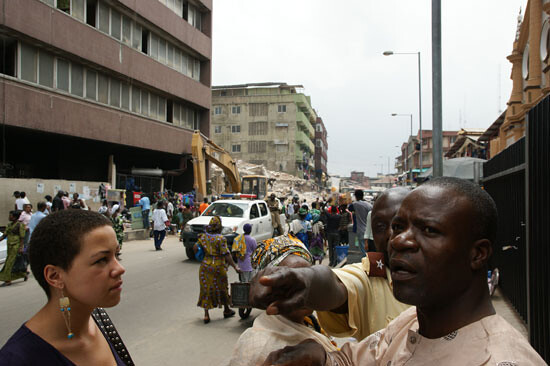

From Dortmund to Lagos
In April 2009, HMKV, located in Dortmund, Germany, participated in an exchange program organized by the Goethe-Institute called Cultural Managers from Africa in Cultural Institutions in Germany. For two weeks Hansi Loren Momodu, curatorial assistant at CCA Lagos, was a guest at HMKV’s offices, observing the practical work of operating a German Kunstverein, especially in the area of media-based artistic practices. The Goethe-Institute has always been keen on follow-up projects (a kind of sustainability!) so at the end of Hansi’s stay we thought about possibilities for future cooperation. I said that, unfortunately, I had no links to Nigeria or to any other African country. But as soon as I said this, I realized it wasn’t true. There was indeed something that connected me to Nigeria—if only indirectly.
I told Hansi in detail about NSK’s “immaterial state.” In addition to its temporary embassies and consulates materializing from time to time in various places, the NSK State in Time issues passports as a “confirmation of temporal space” (NSK), which can be obtained by any person irrespective of citizenship or nationality. I told her that these passports were printed by the same printing house as the real Slovenian passports, and that they were hugely popular, especially among Nigerians. Holding one quarter of all NSK passports issued since 1991, Nigerians represent the largest single group of citizens of the NSK State. I also told her that the state’s founding artists were extremely worried that people might use the NSK passport in ways that were never intended, such as trying to leave Africa and come to Europe. I also explained that we constantly received e-mails and telephone calls from Nigerians asking for information on how to organize a trip to the NSK State in Time, and where to go and whom to contact once they arrived. Finally, I told her that the state’s founding artists were afraid that the NSK passports were traded on the black market and that people paid horrendous sums to shady middlemen who promised that the passport provided entry into the First World. What a crushing disappointment it would be when they found out this wasn’t true! So, Hansi and I agreed that it was time for the state’s founding artists to travel to Nigeria and see the situation for themselves—and, if necessary, to inform the unsuspecting Nigerians about the true nature of the NSK passport.
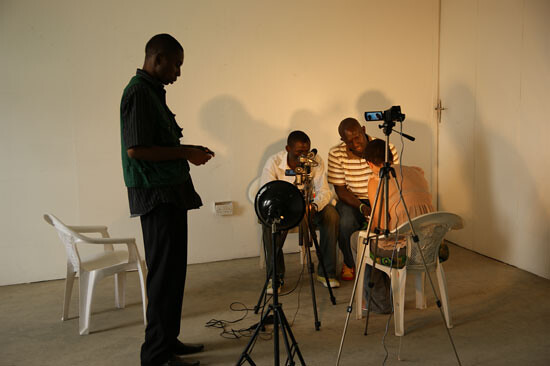

“Be home before sunset”: Lagos, Nigeria
I arrived at Murtala Mohammed International Airport in Lagos just over a year later, at eight o’clock in the evening. It was pitch dark. A city of over twenty million inhabitants in one of the most oil-rich countries in the world had no street lights. As I learned later, Lagos is a megalopolis without a functioning electricity network. Eddy, who would be our driver for the entire week, was waiting for me at the airport. He welcomed me warmly. As we drove along the highway from the airport to the city center, pedestrians constantly crossed the street in total darkness, suddenly looming up in front of our car illuminated only by the headlights. At one point Eddy said, “See the big cars on the side of the street?” Tank-like armoured vehicles stood half-covered at intervals of 300 meters. “Police” Eddy said. “Some years ago it was normal to get robbed on the street leading from Lagos airport to downtown. Things have gotten much better lately.” I was very happy to hear this, although it took me a moment to realize the significance of what he had said.
Miran Mohar and Borut Vogelnik from IRWIN had arrived a few days earlier and had already familiarized themselves with the surroundings.3 They had begun conducting interviews with Nigerian NSK passport holders and applicants at the CCA Lagos. The CCA is a truly amazing place—virtually the only site for contemporary art in the entire city of Lagos. It exists thanks to the initiative of a single woman, Bisi Silva, who not only raises the funds to run the center but who also donated all of her own books, transforming the upper floor into a small public library focussing on contemporary art and theory. The lower floor is usually used for exhibitions and workshops.
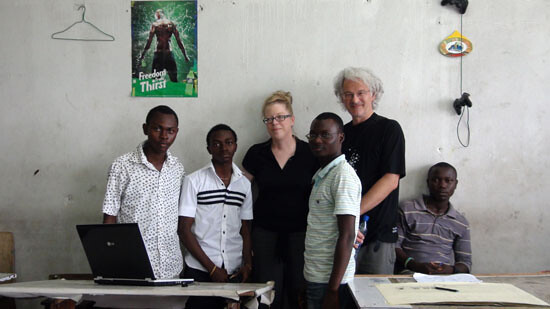

The event entitled Towards a Double Consciousness: NSK Passport Project took place at the CCA July 26–31, 2010. It consisted of screenings, lectures, and panel discussions. The final panel discussion addressed the NSK State’s “Nigerian connection” and the significance that the state had taken on in the contemporary Nigerian consciousness.4 The announcement and outline for this discussion read:
Since the initial presentations around the world in the 1990s of State in Time, the project is currently receiving a substantial number of requests for citizenship to the NSK State from Africa, especially from Nigeria. This has resulted in many Nigerians assuming a dual identity as holders of NSK and Nigerian passports. In view of these new developments, IRWIN conducted interviews with African/NSK citizens living in London, to ascertain their reasons for applying. Could it be in support of the initial artistic purpose of NSK? Do they see it as an avenue with which to move from one territory to another? Or is it for other socio-political reasons? Towards a Double Consciousness: NSK Passport Project will allow further debate on both the artistic and political implications of the NSK State in Time action, offering an examination of their original artistic interventions within the Nigerian context … Towards a Double Consciousness attempts to interrogate the way in which artists propose and individuals search for alternative—real or fictional—possibilities that go beyond notions of a fixed identity or geography.5
The NSK Passport Project proved to be a truly intense and ambivalent experience—certainly for the three of us, but also, in different way, for the CCA Lagos team (Bisi Silva, Hansi Momodu, and Jude Anogwih). Two of the NSK State’s founders, who had always thought of the state as an abstract concept and an intellectual tool, were suddenly confronted with a position that no longer maintained a “safe” ironic distance from the promise made by the NSK passport. They found themselves in a situation where it was necessary to speak very clearly and directly about what their state was and was not, and what its passport could and could not do. Ambivalence and irony did not prove helpful when the genuine fear was that the promise made by a document—acquired directly from the artists or bought on the black market—would soon prove to be empty.
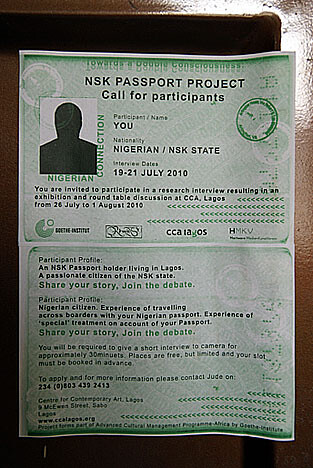

During the two-hour discussion at the CCA it became clear that what once had been conceived as an “escape vehicle” had, in the minds of the Nigerian applicants and passport holders, transformed into an “entry vehicle,” or at least the promise of such. Originally, the NSK State was founded as an alternative to the exclusively national (Slovene) identity that the artists were confronted with when Slovenia seceded from Yugoslavia. It was conceived as almost the opposite of the new Republic of Slovenia, which had declared its independence in 1991. As an artistic concept of a state, it defined itself neither through a concrete geographical territory nor through an ethnically fixed Staatsnation (nation state). Instead, the NSK emphasized the notion of time, understood as a new productive category for the definition of space. Within this terminology, time was equated with the individual accumulation of experiences. Eda Čufer and IRWIN defined this new “geography of time” as follows: “The real … ‘fatherland’ of the individual is limited … to the circle of his own individual experience, to that which exists and not that he was born into.” Therefore, the “territorial borders of the NSK state can by no means be equated with the territorial borders of the actual state in which NSK originated.”6 Rather, the NSK State in Time is defined as an abstract body whose borders are in a state of constant flux depending on the activities of its physical and symbolic body, and whose territory is situated in the consciousness of its “members.” Eda Čufer and IRWIN define the State in Time as
an abstract organism, a suprematist body, installed in a real social and political space as a sculpture comprising the concrete body warmth, spirit, and work of its members. NSK confers the status of a state not upon territory but upon the mind, whose borders are in a state of flux, in accordance with the movements and changes of its symbolic and physical collective body.7
The State issues passports as a “confirmation of temporal space.” There are many instances where fiction crosses into reality—like the story about NSK using the same passport printing house as the Republic of Slovenia. But telling this story in Lagos during the panel discussion, where about twenty-five Nigerian applicants or passport holders eagerly awaited any kind of proof of the “real” potential of the passport, would have fed into the very economy of expectations that the NSK state founders came to Nigeria to discourage. Similarly, telling the amazing—and true—stories of Bosnians who managed to cross international borders in the late 1990s with nothing other than the NSK “document” would have been irresponsible.8 That is why these stories were never mentioned during the panel discussion in Lagos. Even if these (few) cases really did happen, it did not feel right to mention them, as they could easily be read as “proof” of the validity of the passport, for which it would then be worth paying large amounts of money on the black market.
Miran Mohar and Borut Vogelnik very explicitly discussed the reasons for creating the NSK State in Time and the intended purpose of the passport. They stressed that the NSK State in Time was not an existing country and that it should by no means be confused with the actual Republic of Slovenia. Towards the end of the event we were convinced that the audience had “understood the initial artistic concept” of the NSK. However, at the very end of the panel discussion, two memorable statements were voiced. One member of the audience said, “A friend of mine has a friend who knows somebody who has already been there. He said that it is a beautiful country.” Shame on us who had thought that the roller coaster of emotions had ended! The IRWIN members once more explained patiently that the NSK State in Time is a state of mind rather than an existing state that one can travel to. The second—and positively devastating—statement came from a young man with stylish 1970s sunglasses who had been sitting silently throughout the whole event: “Listen, I think that everybody in this room perfectly understood what you have been telling us over the last two hours [meaning: don’t think we Africans are stupid!]. But, still, I think that holding an NSK passport is a good thing. Because the NSK State in Time could come into being at some point in the future, you know?”
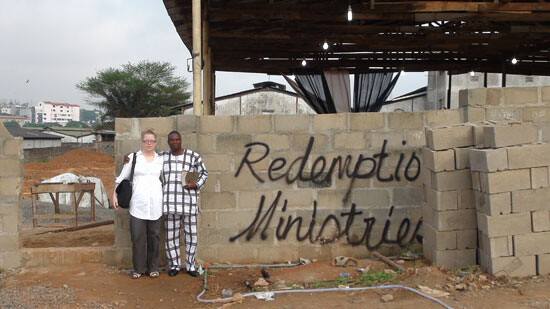

“Lock your doors, I will not stop”: The NSK Passport and the Nigerian 419 Scam
Lagos Island, located just opposite Lagos Mainland, is a huge gated community for the very rich—the upper class of Nigerian society as well as expats working for international oil companies. The property prices are beyond comprehension, even higher than in Paris, London, or Tokyo. The three highway bridges connecting the island to the mainland are guarded by heavily armed police forces dressed in splendid uniforms. One night, we stayed out after nightfall. Leaving the bar around 10:30 p.m., Eddy drove us back from Lagos Island to our hotel on the mainland. It was pitch dark again. Suddenly, we saw a group of young men dancing into the street in front of our car, lit only by our headlights. “Lock your doors,” Eddy said calmly as he rolled up the automatic windows. “I will not stop.” Luckily, we did not hit any of the dancing men. A few days after this incident an artist at the CCA told us that on that very night he had made the mistake of stopping his car at the same spot. He was robbed—the thieves used the exact same “dancing onto the street” trick and took his money and camera.
Imagine if only one out of every five hundred cars stops. Possibly one in five hundred will also hit one of the dancing men—but that’s the risk, I guess, of what Giorgio Agamben has called “bare life.” That one successful theft in a sea of failed attempts reminded me of the logic of e-mail spam, or more precisely, of something called the “Nigerian Letter,” the “419 fraud,” or the “Nigerian bank scam.”9 Millions of e-mails are sent out and perhaps one person will answer and fall for the fraud.10 The 419 scam began in the early 1980s as the oil-based Nigerian economy went into decline. Several unemployed university students first used this scam to manipulate visiting businessmen who were interested in shady oil deals. They later targeted businessmen in the West, and then the wider population. According to Insa Nolte of the University of Birmingham’s Centre of West African Studies, advance-fee fraud boomed in Nigeria in the 1990s as government corruption and economic stagnation fuelled poverty and disillusionment in the country. To some, internet scams looked like an easy way to bag some quick cash. Scammers in the early-to-mid 1990s targeted companies, sending scam messages via letter, fax, or Telex. The spread of e-mail and easy access to e-mail harvesting software significantly lowered the cost of sending the scam letters.11“The availability of e-mail helped to transform a local form of fraud into one of Nigeria’s most important export industries,” says Nolte.12
Is it possible that the NSK passport is read by Nigerians as some kind of 419 scheme? As the promise of an unexpected fortune waiting out there, which you can obtain by paying a small fee? Or, formulated differently, do they believe in the NSK passport because one in five hundred just might be genuine? Did the Nigerian applicants and passport holders seriously regard the NSK passports—originally conceived as escape vehicles—as entry vehicles which would allow them to cross international borders? Ultimately, we did not find out. But we realized that the power of belief, even if supported only by rumors, even against better judgment, is a force to be reckoned with.
On our last day in Nigeria, a Sunday, Eddy invited us to attend church at Redemption Ministries. Before the service there was a business seminar addressing the question “Where to find money?”—especially poignant in a church made up of half-finished walls and a makeshift corrugated metal roof. During the service, after the preacher warned insistently against “witches in the household,” members of the parish got up one after the other, raised their arms, and began speaking in tongues. It occurred to me that I was in a Pentecostal church whose members believed not so much in Jesus or God the Father, but in the Holy Spirit which takes possession of their bodies and tongues during the service. This led me to realize that in Nigeria, the NSK passport functioned not so much as a “confirmation of temporal space” but as a material vessel for something spiritual—a fierce hope in the possibility of a better future. The passport is neither of these—or, rather, it is something in between. It exists simply because people have heard rumours about it and have become convinced that it might come in handy some day if they already have legal travel documents. A utopian-pragmatic position, so to speak, that trusts in the power of believing.
On the strategy of overidentification see Inke Arns, “Mobile Staaten / Bewegliche Grenzen / Wandernde Einheiten. Das slowenische Künstlerkollektiv Neue Slowenische Kunst (NSK)” in Netzkritik: Materialien zur Internet-Debatte, ed. nettime / Geert Lovink, Pit Schultz (Berlin: Edition ID-Archiv, 1997), 201–211; Inke Arns, Neue Slowenische Kunst (NSK)—eine Analyse ihrer künstlerischen Strategien im Kontext der 1980er Jahre in Jugoslawien(Regensburg: Museum Ostdeutsche Galerie, 2002); Inke Arns and Sylvia Sasse, “Subversive Affirmation: On Mimesis as Strategy of Resistance,” in East Art Map: Contemporary Art and Eastern Europe, ed. IRWIN(Cambridge, MA: MIT Press, 2006), 444–455; “Subversive Affirmation,” eds. Inke Arns and Sylvia Sasse, Maska Vol. XIX/ 3–4 (98-99) (2006).
See, for example, →.
Like most residential houses in Lagos, our hotel was surrounded by a high wall topped with barbed wire (or, alternatively, glass splinters). There were two generators in the courtyard beneath our windows that ran all night. Like our neighbors’ generators, they were pretty loud.
Speakers included Dr. Inke Arns, IRWIN members Miran Mohar and Borut Vogelnik, and Nigerian NSK passport holders. The panel was moderated by Loren Hansi Momodu and took place on July 31.
The passage omitted from this quote reads: “This project forms part of CCA Lagos’ year-long program On Independence and The Ambivalence of Promise, celebrating 50 years of independence by seventeen African countries including Nigeria on the 1st October 2010. It provides an avenue to interrogate notions of nationhood at a time when our idea of citizenship is continuously being challenged by state policies such as Nigeria’s contentious ‘federal character’ system or through religious and ethnic disturbances such as the recent unrest in the city of Jos, as well as the perennial civic unrest of the oil-rich Niger Delta.”
Eda Čufer and IRWIN, “Concepts and Relations” (1992), in IRWIN, Zemljopis Vremena / Geography of Time, exhibition catalogue (Umag, 1994). The full quote reads: “The role of art and artists in defining time which belongs to them individually is more effective than in defining territory. The real, not imaginary, ‘fatherland’ of the individual is limited to the circle of the house in which he was born, the classroom or the library in which he acquired knowledge, the landscapes in which he walked, the spaces to which he is oriented, to the circle of his own individual experience, to that which exists andnot that he was born into. The territorial borders of the NSK state can by no means be equated with the territorial borders of the actual state in which NSK originated. The borders of the NSK state are drawn along the coordinates of its symbolic and physical body, which at the time of its activity acquired objective values and objective status.”
Eda Čufer and IRWIN, “NSK State in Time”(1993), ibid. NSK makes a distinction between its “citizens” and its “members.” In practice, “citizens” are anyone who can scrape together the money for a passport, while only fifteen special people qualify as “members” (paraphrasing Michael Benson).
Bosnians did this because Bosnia was not then internationally recognized and so people had no papers that would allow them to cross international borders.
The number 419 refers to the article of the Nigerian Criminal Code dealing with fraud (part of Chapter 38: “Obtaining Property by false pretences; Cheating”).
See →.
The 419 scam has been imitated by people in other Africa nations and in countries throughout the world, including the Philippines, Malaysia, Russia, Australia, Canada, the United Kingdom, and the United States.
Quoted in Robert Andrews, “Baiters Teach Scammers a Lesson”, Wired, August 4, 2006. See →.
Category
Subject
This essay was originally delivered to the First NSK Citizens’ Congress at the Haus der Kulturen der Welt, Berlin, October 2010, and then published in State of Emergence: A Documentation of the First NSK Citizens’ Congress, ed. Alexei Monroe (Leipzig: Plöttner Verlag, 2011).
